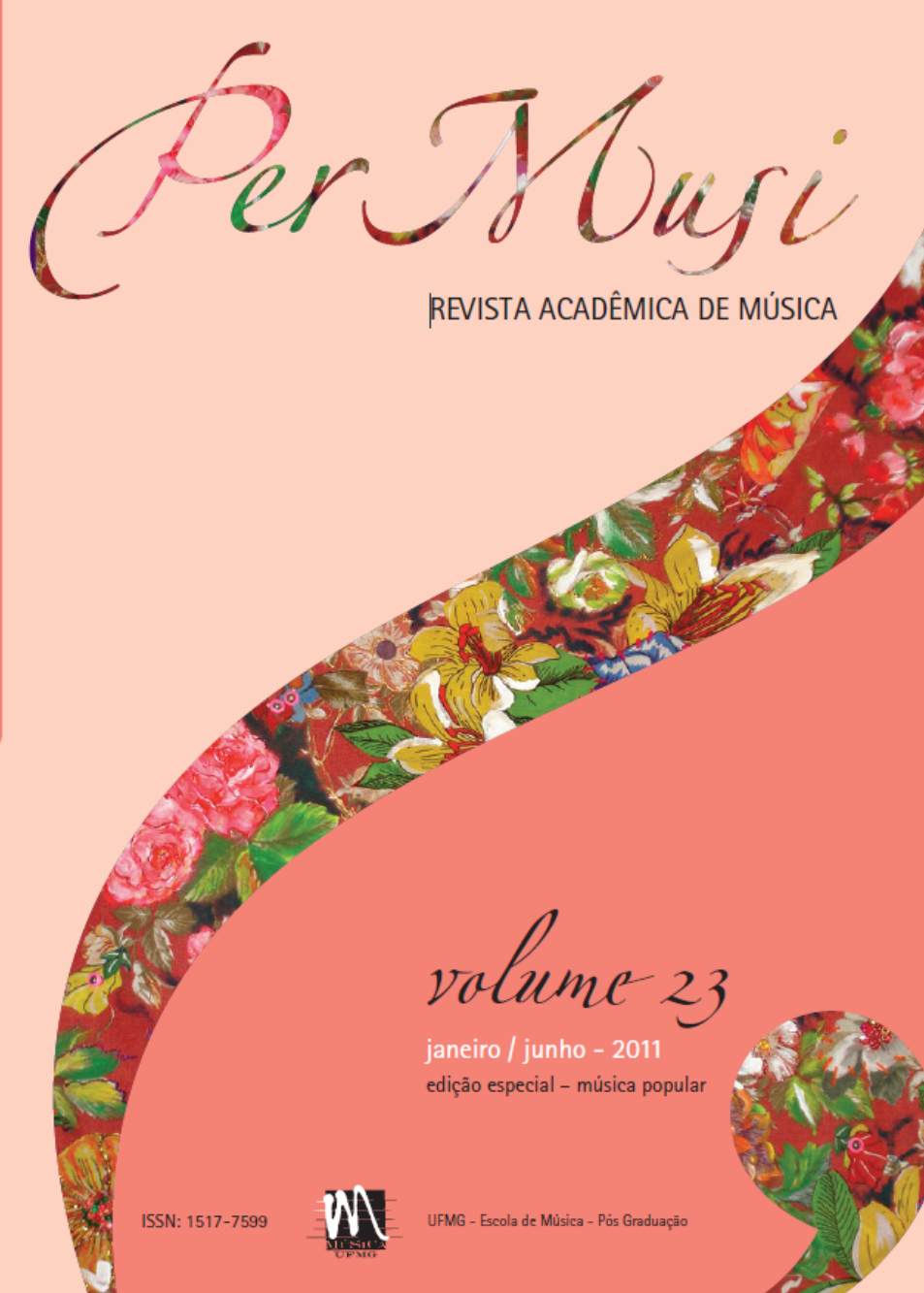O percurso histórico da improvisação no ragtime e no choro
Palavras-chave:
Ragtime, Choro, Improvisação, Música popular brasileira, Música popular norte-americanaResumo
O artigo teve como objetivo investigar em que medida a improvisação e a tradição oral permitiram a consolidação do ragtime e do choro em gêneros musicais com aceitação popular na virada do século XIX. A escolha concentrou-se nas semelhanças formais existentes entre ambos e nos caminhos percorridos por ambos para essa consolidação. A partir dos conceitos de territorialização e desterritorialização criados por Gilles Deleuze e Félix Guattari, incorporados à improvisação musical por Rogério Costa, verificamos o tipo de improvisação utilizado nesses dois gêneros. O relato histórico reafirma a ideia de D. Bailey de que a improvisação está sempre presente na criação de novos sistemas notacionais, gêneros e estilos musicais, ainda que nos processos de transmutação, ela saia de cena. O texto é parte da dissertação de mestrado defendida no IA-UNESP.
Referências
ANÔNIMO. When the Saints go Marchin In. Partitura digitalizada em Finale.
BAILEY, Derek. Improvisation: its nature and practice in music. USA: Da Capo Press, 1993.
BERLIN, Edward A. A biography of Scott Joplin. Scott Joplin International Ragtime Foundation. 1998. in http://www.scottjoplin.org/biography.htm acessado em 28/04/2009.
CARRASQUEIRA, Maria José (coordenação). O livro de Pattápio Silva: obra completa para flauta e piano. São Paulo: Irmãos Vitale, 2001.
CAZES, Henrique. O Choro: do quintal ao municipal. São Paulo: Ed. 34, 1998.
COLLIER, James Lincoln. Jazz: a autêntica música americana; tradução Carlos Sussekind, Teresa Resende da Costa. Rio de Janeiro: Jorge Zahar Ed., 1995.
COSTA, Rogério Luiz Moraes. Improvisação livre e idiomática: a máquina e o mecanismo, o que deve comunicar a música? In: Música Hodie; Revista do programa de Pós-Graduação Stricto-Senso da Escola de Música e Artes Cênicas da Universidade Federal de Goiás. Vol. 2 (n. 1/2, 2002): UFG, 2002.
COSTA , Rogério Luiz Moraes. O músico enquanto meio e os territórios da livre improvisação. Tese apresentada ao curso de Doutorado do Programa de Comunicação e Semiótica da PUC-SP, 2003.
DALAROSSA, Daniel. Uma palavra sobre interpretação e improvisação: In Ernesto Nazareth: clássicos do Choro brasileiro, vol. 1. São Paulo: Global Choro Music Corporation, 2007.
DELEUZE, Gilles: GUATARI, Félix. 1837 – A cerca do ritornelo. In mil platôs, vol. 4. Tradução Suely Rolnik. São Paulo: Ed. 34, 1997.
DICCIONARIO DE LA MUSICA LABOR. Barcelona: Editorial Labor, 1954.
DICIONÁRIO ELETRÔNICO HOUAISS. Versão 1.0. Editora Objetiva Ltda., 2001.
DICIONÁRIO GROVE DE MúSICA. Edição concisa. Rio de Janeiro: Jorge Zahar Ed., 1994
GODOY, Sibila. Dança das cabeças: a trajetória musical de Egberto Gismoni. In Pesquisa e Música. Revista do Conservatório Brasileiro de Música, Volume 5, Número 1, p.58-65, 2000.
HOBSBAWM, Eric J. História social do jazz. Tradução Ângela Noronha. São Paulo: Editora Paz e Terra S/A, 1989. <<http://en.wikipedia.org/wiki/Piano_roll>> acessado em 22/04/2009. <<http://lcweb2.loc.gov/diglib/ihas/loc.natlib.ihas.200035811/default.html>> acessado em 19/10/2009.
JOPLIN, Scott. School of ragtime: exercises for piano by Scott Joplin. New York: Scott Joplin, 1908.
KIEFER, Bruno. Música e dança popular: sua influência na música erudita. Porto Alegre: Editora Movimento, 1990.
MALSON, Lucien: BELLEST, Christian. Jazz. Tradução Paulo Anderson Fernandes Dias. Campinas: Papirus, 1989.
NAZARETH, Ernesto. Odeon. Partitura digitalizada em Finale.
RIZZO, Jacques. Reading jazz: the new method for learning to read written jazz music. Miami: Belwin, 1989.
SÁ, Paulo. O Improviso do choro. In Pesquisa e Música. Revista do Conservatório Brasileiro de Música, Volume 5, Número 1, p.66-70, 2000.
SAGER, David. A History of Ragtime. in: << http://lcweb2.loc.gov/diglib/ihas/loc.natlib.ihas. 200035811/default.html>> acessado em 4/10/2009.
SUZIGAN, Geraldo: SUZIGAN, Maria Lúcia. Educação musical: um fator preponderante na construção do ser. São Paulo: CLR Balieiro, 1986. Coleção ensinando-aprendendo, aprendendo ensinando. Cadernos brasileiros de educação.
THE NEW HARVARD DICTIONAY OF MUSIC. USA, Harvard University Press Reference Library, 1969. THE OXFORD COMPANION TO MUSIC: New York: Oxford University Press, 1997.
TINHORÃO, José Ramos. Música popular: um tema em debate. São Paulo: Editora 34 Ltda. 1997, 3ª edição.
_____. Pequena história da música popular brasileira: da modinha à lambada. São Paulo: Art Editora Ltda., 1991.
Downloads
Publicado
Edição
Seção
Licença

Este trabalho está licenciado sob uma licença Creative Commons Attribution 4.0 International License.

Exceto onde está indicado, o conteúdo neste site está sob uma Licença Creative Commons - Atribuição 4.0 Internacional.












